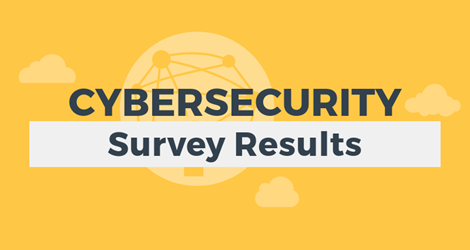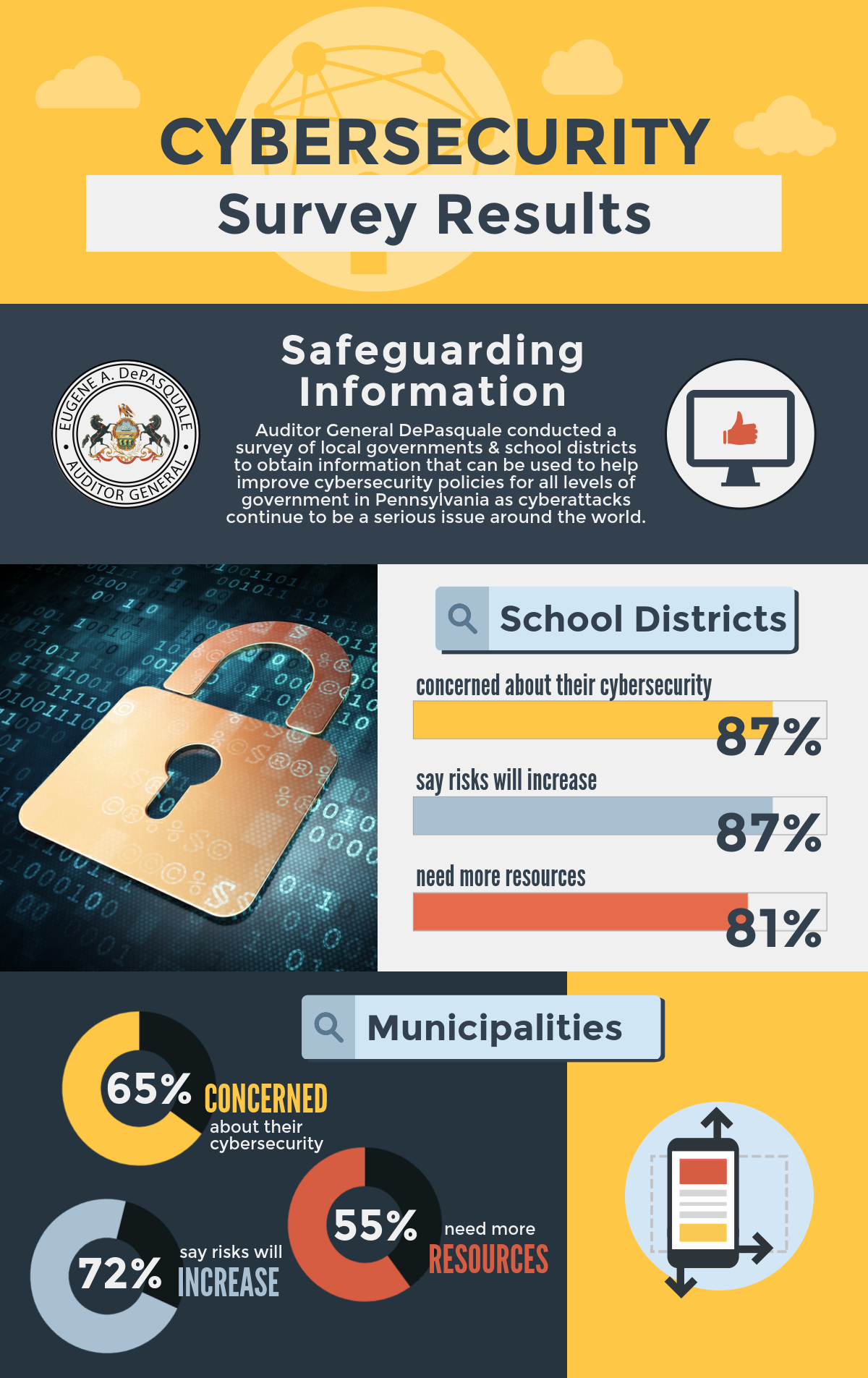Auditor General DePasquale Surveys Find Majority of School Districts, Local Governments Concerned about Increasing Cybersecurity Risks
Results indicate cybersecurity requires constant vigilance to safeguard information
Auditor General DePasquale Surveys Find Majority of School Districts, Local Governments Concerned about Increasing Cybersecurity Risks
Results indicate cybersecurity requires constant vigilance to safeguard information
HARRISBURG (Oct. 12, 2017) – Auditor General Eugene DePasquale today said recent surveys conducted by his office show a majority of school districts and local government officials are concerned about cybersecurity and expect the risks will increase.
“While a lot of attention, rightly so, is being put on the data breach at Equifax, we cannot ignore the cybersecurity needs of our school districts and local government offices,” DePasquale said, noting that breaches could put at risk Social Security numbers, tax information and student records of individual Pennsylvanians.
“The fact that the majority of survey respondents said they are ‘concerned’ about their levels of cybersecurity should be a wakeup call,” he said.
The anonymous statewide surveys were conducted over three weeks in August and September, collecting 954 responses, including 177 from school districts and 777 from municipalities.
“Even more concerning from the survey is the near-unanimous conclusion from municipal and school officials that the risks of cyberattacks will increase,” DePasquale said. “These surveys highlight cybersecurity concerns, but we must take action before a municipality or school district data breach occurs,” he said, noting that the Maricopa County Community College system in Arizona paid over $26 million after more than two million residents’ data was compromised in 2014.
“It is not surprising that a majority of respondents indicated they need more resources to prevent, detect and respond to potential cyberattacks,” he said. “Given the out-of-balance state budget and ongoing financial challenges, we need to find creative ways to help municipalities and schools be better prepared for cyberattacks.”
Voters in Washington state approved a 2014 ballot initiative that sets aside $40 million from the state sales tax for cybersecurity reviews.
“Pennsylvania does not even have a balanced budget, let alone tens of millions of dollars for a much-needed overhaul of IT and cybersecurity at all levels of government,” DePasquale said. “What we do have are some of the best high-tech universities in the country. There could be opportunities for universities to partner with municipalities and school districts to improve cybersecurity.”
DePasquale said he has shared the results of the survey with the governor’s office and state agencies that work directly with local governments and school districts.
October is considered National Cybersecurity Awareness Month.
# # #
EDITOR’S NOTE: Following are results of surveys conducted by the Department of the Auditor General in August and September of Pennsylvania municipalities and school districts.
Survey Results:
Municipalities: 777 (31.08%) respondents
Q1: How concerned are you about your municipality's cybersecurity/information security?
Very Concerned: 197 (25.35%)
Somewhat concerned: 316 (40.67%)
A little concerned: 178 (22.91%)
Not concerned at all: 86 (11.07%)
Q2: Are you confident in your municipality's ability to detect and respond to cybersecurity incidents?
Yes, confident: 312 (50.81%)
No, not confident: 302 (49.19%)
Q3: As cyber-attacks become more common around the world, do you think that cyber security risks will increase, decrease, or remain the same for school districts like yours?
Increase in cybersecurity risk: 450 (71.77%)
Decrease in cybersecurity risk 4 (0.64%)
Remain the same: 173 (27.59%)
Q4: Do you employ a cyber security professional or consult with one?
Yes, employ/consult: 177 (28.46%)
No, do not employ/consult: 423 (68.01%)
Don’t know: 22 (3.54%)
Q5: Do you feel that your municipality needs additional resources to combat cybersecurity, or does it have enough resources?
Needs additional resources: 340 (55.02%)
Has enough resources: 278 (44.98%)
Q6: Below is a list of possible resources to help improve a municipality's cyber security. Select ones that would be helpful to your municipality.
Additional funding: 301 (48.94%)
A resources center to turn to with questions: 358 (58.21%)
A statewide agency to go to in emergencies: 317 (51.54%)
Preemptive review or information on good cybersecurity practices: 250 (40.65%)
None: 65 (10.57%)
Other: 32 (5.20%)
School Districts: 177 (35.4%) respondents
Q1: How concerned are you about your municipality's cybersecurity/information security?
Very Concerned: 85 (48.30%)
Somewhat concerned: 68 (38.64%)
A little concerned: 19 (10.80%)
Not concerned at all: 4 (2.27%)
Q2: Are you confident in your municipality's ability to detect and respond to cybersecurity incidents?
Yes, confident: 116 (65.91%)
No, not confident: 60 (34.09%)
Q3: As cyber-attacks become more common around the world, do you think that cyber security risks will increase, decrease, or remain the same for school districts like yours?
Increase in cybersecurity risk: 154 (87.01%)
Decrease in cybersecurity risk: 1 (0.56%)
Remain the same: 22 (12.43%)
Q4: Do you employ a cyber security professional or consult with one?
Yes, employ/consult: 55 (31.43%)
No, do not employ/consult: 120 (68.57%)
Don’t know: 0 (0%)
Q5: Do you feel that your municipality needs additional resources to combat cybersecurity, or does it have enough resources?
Needs additional resources: 144 (81.36%)
Has enough resources: 33 (18.64%)
Q6: Below is a list of possible resources to help improve a municipality's cyber security. Select ones that would be helpful to your municipality.
Additional funding: 140 (79.55%)
A resources center to turn to with questions: 128 (72.73%)
A statewide agency to go to in emergencies: 125 (71.09%)
Preemptive review or information on good cybersecurity practices: 132 (75%)
None: 4 (2.27%)
Other: 14 (7.95%)

